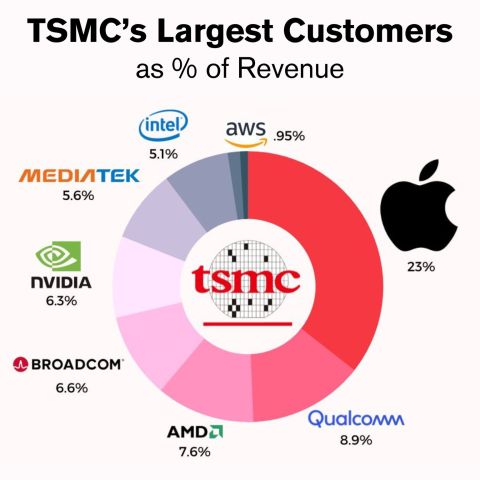Top 8 TSMC Customers by Revenue Share: Who Powers the World's Leading Foundry
TSMC's customer portfolio reads like a who's who of the tech industry. From Apple's iPhone processors to NVIDIA's AI accelerators, discover which companies drive the world's most advanced semiconductor foundry and why their relationships matter.

Taiwan Semiconductor Manufacturing Company (TSMC) doesn't just manufacture chips—it manufactures the future. With over 60% of the global foundry market and exclusive production of the world's most advanced processors, TSMC's customer relationships shape entire industries.
But who are the tech titans that depend on TSMC's fabrication capabilities? This deep dive reveals TSMC's top 8 customers by revenue share and explores why these partnerships are critical to the global technology ecosystem.
TSMC's Elite Customer Portfolio
Revenue Concentration Analysis
Customer Concentration
Market Segments
Top 8 TSMC Customers by Revenue Share
Apple
Consumer Electronics Giant
Key Products
- • A-series iPhone processors
- • M-series Mac processors
- • Apple Watch S-series
- • AirPods H-series chips
Process Nodes
- • 3nm (A17 Pro, M3)
- • 5nm (A14-A16, M1-M2)
- • 7nm (A12-A13)
- • Leading-edge exclusive
Strategic Value
- • Largest single customer
- • Premium pricing acceptance
- • Technology co-development
- • Massive volume guarantee
Qualcomm
Mobile Technology Leader
Key Products
- • Snapdragon mobile SoCs
- • 5G modems and RF
- • Automotive processors
- • IoT and edge AI chips
Process Nodes
- • 4nm (Snapdragon 8 Gen 3)
- • 5nm (Snapdragon 888/8 Gen 1)
- • 7nm (Snapdragon 855/865)
- • Multiple node strategy
Strategic Value
- • Android ecosystem anchor
- • 5G technology leadership
- • Automotive growth vector
- • Consistent high volumes
AMD
CPU & GPU Competitor
Key Products
- • Ryzen CPUs (Zen architecture)
- • EPYC server processors
- • Radeon GPUs (RDNA)
- • Data center accelerators
Process Nodes
- • 5nm (Zen 4, RDNA 3)
- • 7nm (Zen 2/3, RDNA 2)
- • Advanced packaging
- • Chiplet architectures
Strategic Value
- • Intel alternative strategy
- • Data center growth
- • AI/ML acceleration
- • Technology partnership
Broadcom
Infrastructure & Connectivity
Key Products
- • WiFi and Bluetooth chips
- • Networking switches
- • Storage controllers
- • RF front-end modules
Process Nodes
- • 7nm (networking ASICs)
- • 16nm (switch chips)
- • 28nm (WiFi/BT)
- • Mixed-node portfolio
Strategic Value
- • Infrastructure backbone
- • Apple partnership
- • Enterprise networking
- • Consistent margins
NVIDIA
AI accelerators, data center GPUs, gaming graphics cards
MediaTek
Smartphone SoCs, WiFi chips, smart TV processors
Intel
GPU tiles, chipsets, specialized processors
AWS
Custom cloud processors, AI inference chips
Customer Relationship Dynamics
Partnership Models
Technology Co-Development
Joint development of process technologies and design optimization
Capacity Partnerships
Long-term capacity commitments and volume guarantees
Strategic Alliances
Exclusive access to leading-edge nodes and technologies
Revenue Characteristics
Premium Pricing
Advanced nodes command 2-3x pricing premium
Volume Economics
Large customers receive volume discounts and priority allocation
Technology Access
Early access to new nodes in exchange for development partnership
Market Impact and Dependencies
Industry Dependencies
Smartphone Market
Data Center/AI
Infrastructure
Risk Factors
Customer Concentration Risk
- • Apple represents 23% of revenue
- • Top 3 customers = 38% of revenue
- • High dependency on smartphone market
- • Cyclical demand patterns
Mitigation Strategies
- • Diversification into automotive/IoT
- • Growing AI/data center segment
- • Long-term capacity agreements
- • Technology leadership moat
Future Customer Landscape
Emerging Customer Segments
Automotive
Self-driving, ADAS, infotainment systems
Edge AI
IoT devices, smart cameras, industrial automation
Custom Silicon
Cloud providers, hyperscalers, specialized workloads
Strategic Implications
Customer Evolution
- • More tech companies designing custom chips
- • Shift from general-purpose to specialized silicon
- • Increased demand for advanced packaging
- • Growing importance of AI accelerators
TSMC Response
- • Expanding advanced packaging capabilities
- • Investing in specialized process technologies
- • Building closer customer partnerships
- • Geographic capacity expansion
The Foundation of Digital Innovation
TSMC's customer portfolio represents the entire spectrum of modern technology—from the smartphones in our pockets to the AI systems reshaping industries. These partnerships aren't just business relationships; they're the foundation of digital innovation.
The concentration of revenue among key customers like Apple, Qualcomm, and AMD reflects both the strength of these relationships and the strategic importance of advanced semiconductor manufacturing. As these companies push the boundaries of what's possible with silicon, TSMC's role as their manufacturing partner becomes increasingly critical.
Looking ahead, TSMC's ability to attract and serve new customer segments—from automotive to edge AI—will determine not just the company's growth, but the pace of technological advancement across all industries. In the semiconductor world, TSMC's customers today become tomorrow's technology leaders.
Validate Your Chips Regardless of Foundry
Whether your chips are manufactured by TSMC or other foundries, comprehensive validation ensures they meet performance and reliability requirements. TestFlow's AI-powered platform provides the testing capabilities you need for any semiconductor design.